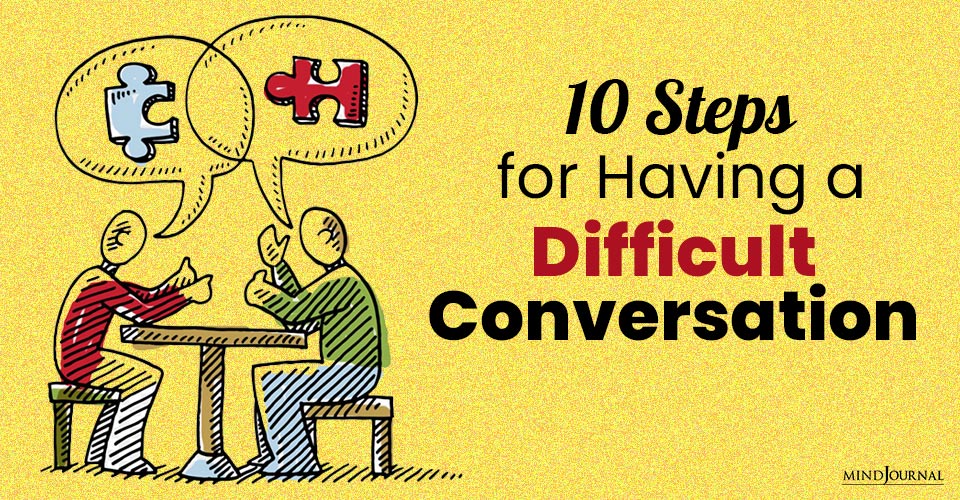It’s natural for anyone to want to avoid a difficult conversation. But given current events today, these conversations are more and more likely to occur. It’s important that we stay open and empathetic in these conversations rather than cut people off.
We need to build connection rather than create larger divides towards extremism.
When you recognize that it’s time to have a difficult conversation, here are 10 steps you can take to prepare and then host the conversation.
1. Find the reason/purpose for having this difficult conversation.
“I want to learn what happened from your perspective.”
“I want to give you a chance to express your views/thoughts.”
“I want to problem-solve together.”
Read: The Art of Conversation: 25 Great Conversation Starters
2. Identify what emotions are connected to this conversation or could be triggered in you.
People know me as the “nice guy” but now this person may think I’m mean.
3. Invite the person to have a conversation based on the purpose identified earlier.
“Hey, I felt that the project didn’t go as well as I wanted and I wanted to get your thoughts as well as discuss mine about what we could have done better. Does meeting later today work for you? Or perhaps next week?”
4. Determine the right way to have a conversation with this individual.
Typically, I prefer to just get to the point, but I know this person is shy. Maybe I should schedule extra time to ensure I don’t push too quickly.
Read: How To Keep a Conversation Going? The Art Of Listening For Hooks
5. Assume positive intent.
.Even though I feel hurt, it’s very unlikely that they actually were trying to hurt me.
6. Fact-find.
“The project got delayed, and I would like to hear your perspective as to why and whether we can prevent future delays.”
7. Clarify and dig deeper.
“It sounds like you were really angry because this reflected poorly on your abilities.”
Related: 48 Deep Conversation Starters To Know Someone Better
8. Express your perspective.
“I’m anxious about bringing this up but…”
“There are a number of things that I did that made this more difficult…”
“I think the reason this impacts me more is that I don’t like to think of myself as someone who…”
“I’m finding myself reacting emotionally, and I want to ensure that I stay open and positive in this conversation, are you okay if we just take 10 mins?”
9. Problem-solve.
“Now that we understand each other’s perspectives, how do we prevent this from happening in the future? Specifically, who should do what, when?”
“Let’s test our solution: In a scenario where I notice deadlines are beginning to slip, will our approach help?”
“When should we meet to see if our solution is working?”
10. Reflect and follow-up.
How do I feel now? Satisfied? Anxious?
“Is our solution working? What do we need to adjust?”
This post provides you with just the basics for a difficult conversation and high-level details about how to prepare and host the conversation. However, each of these steps requires a great deal of preparation and insight. Here is further information about how to prepare for and host a difficult conversation.
Remember that we tend to judge ourselves by our intentions, but we judge others by their impact (our interpretation of their actions). So even when we have good intentions, we can have a negative impact—and just because you were negatively impacted, doesn’t mean they had negative intentions. Be kind, give people the benefit of the doubt, and find solutions together.
For more information contact Lauren Florko at http://www.triplethreatconsulting.ca/
References
Stone, D., Patton, B., & Heen, S. (1999). Difficult Conversations: How to Discuss What Matters Most. NY: Penguin Group.
Written by: Lauren Florko, Ph.D.
Originally appeared on: Psychology Today










Leave a Reply